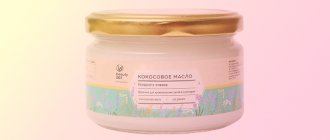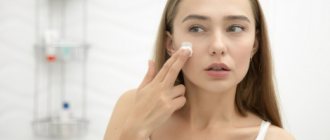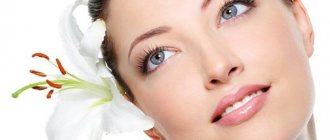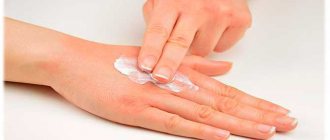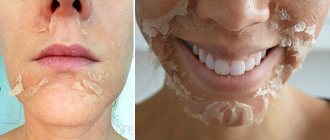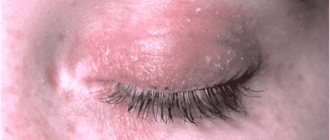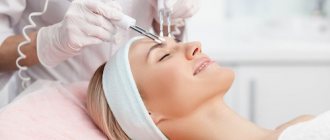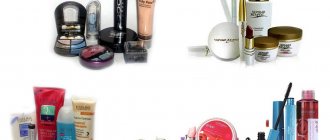Updated: 05/25/2021 18:43:59
Expert: Arefieva Elizaveta Aleksandrovna
Problem skin is considered to be oily epidermis with enlarged pores. However, this is only partly true. In fact, even combination and dry skin can be uncomfortable and require special care. In particular, we are talking about the thin, depleted epidermis on the face.
To fix the problem, you need to study it in as much detail as possible. This will help you properly organize the care process and choose the best options for cosmetics.
Photo: dryskintips.org/
Pros and cons of thin skin on the face
The main reasons for thinning skin are age-related changes, unfavorable heredity and dehydration. And if it is impossible to get rid of the first two provoking factors, then the loss of moisture from the epidermal cells can be eliminated.
The main disadvantages of thin leather are:
- high sensitivity to external factors;
- pallor resulting from a lack of melanin;
- tendency to rapid loss of elasticity due to a lack of fat in their thickness;
- with an incorrect lifestyle, the owner of a thin epidermis may notice the appearance of hyperemia or swelling on the surface of the face;
- tendency to peeling and irritation;
- a feeling of tightness after washing.
In its structure, the thin skin of the face is as close as possible to the epidermis around the eyes, so care for these areas is the same. Therefore, you can use the same cosmetics.
Surprisingly, thin facial epidermis has some advantages
. It is not prone to acne and oily sheen; there are no blackheads or areas with enlarged pores on its surface. However, this is not a reason to refuse careful care of thin skin.
Effective cosmetics and useful procedures
To ensure that thin skin brings as little trouble as possible, and that caring for it does not take much time, you should learn to choose the right cosmetics. It doesn’t hurt to carry out salon or home care treatments from time to time.
How to choose the right cosmetics?
First of all, you should carefully read the ingredients on the label. For thin skin, cosmetics that contain at least one of the following ingredients will be useful:
- allantoin (works for rapid regeneration of the facial surface);
- tocopherol (prevents dehydration and early skin aging);
- hyaluronic acid (nourishes and moisturizes cells);
- retinol (this is vitamin A in liquid form, which makes the dermis elastic);
- ascorbic acid (vitamin C prevents the appearance of rashes and redness);
- oils and plant extracts (nourish the skin, reduce dryness and flaking).
Products with the maximum amount of natural ingredients in the composition, without parabens and other harmful substances, have the best effect on thin skin.
Useful salon treatments
If finances and time allow, full-fledged care for thin skin can be carried out in a cosmetologist’s office:
- phototherapy (IPL) removes veins and spider veins on the face.
The process follows a simple scheme: a cosmetologist uses a special device to apply it over the entire surface of a previously cleaned face, and then fixes the result with a nourishing composition. The procedure is virtually painless, effective and has few side effects.
- biorevitalization replenishes the required amount of moisture in the epidermis.
The procedure rejuvenates the skin, gives an anti-inflammatory effect and strengthens blood vessels. The process is very painful - a solution of hyaluronic acid is injected into small syringes, and then, through a needle, the medicine is sent into the deep layers of the skin. Within 1-2 days, small marks from the injections remain on the face, but after they disappear, the effect is amazing - the skin is firmer, moisturized and looks healthy.
- microcurrent therapy enhances the immunity of the dermis.
In the process, the cosmetologist directs barely noticeable current discharges to the face with a special device, and then applies a special medicinal composition to the skin. The procedure is painless and especially effective for sagging skin.
Procedures at home
Thin skin requires constant care, which can be easily organized at home. It can be:
- natural masks;
- compresses.
The most effective masks are made from ingredients that can be easily found at any housewife.
- Mask with starch.
Mix 30-40 g of potato starch with two teaspoons of cream, let it brew for 30 minutes. Then add vitamin E in the form of oil, put the mixture in the refrigerator for 2.5-3 hours. Store the mask for no more than 3 days, apply daily for 30-40 minutes.
- Cucumber juice mask.
Mix 50 ml of juice with 1 egg white, add a teaspoon of almond oil and 10 ml of retinol or tocopherol, and then sprinkle the mixture with flour. The composition cannot be stored for a long time. Apply the mask once every three days for 30 minutes.
- Light mask with avocado.
Peel the avocado and puree it by hand or in a blender. Add 10 ml olive oil (extra virgin). Store the mask in the refrigerator for no more than 3 days. It can be applied to the face daily for 20-25 minutes.
- Mask made of flour and parsley.
Dilute 10 grams of flour (preferably potato flour) with 20 ml of olive oil. The composition is designed for one use; it is better not to store it even in the refrigerator. Keep on face for no more than 20 minutes.
A compress made from cornflower blue flowers is also considered effective. To prepare the solution, mix at least 20 grams of dried flowers with 100 ml of heated vegetable oil (almond or olive). A fabric mask is soaked in the mixture and applied to the face for 20 minutes.
Features of thin facial skin
The thinned facial epidermis has its own characteristics that are characteristic only of it. They need to be known and taken into account in order to ensure proper care of problem areas. Main features of thin skin:
- absence of unnatural shine and greasy film;
- velvety and matte;
- absolutely smooth surface without areas with enlarged pores;
- tightness, excessive dryness and tendency to frequent peeling;
- frequent hyperemia due to capillaries located close to the surface of the epidermis;
- pallor;
- tendency to develop bruises under the eyes due to prominent veins.
Thin skin is easily irritated when exposed to negative external factors. They can be either cigarette smoke and cold air, or heat, and even the purchase of new cosmetics.
Factors that harm thin facial skin
Photo: self.com/
No amount of care, even the most correct and thorough, can improve the condition of the thin epidermis unless the influence of certain negative factors on it is excluded. Most of all, problematic skin is harmed by:
- excess ultraviolet radiation;
- windy and frosty weather;
- temperature changes;
- hard tap water;
- incorrectly selected or low-quality cosmetics.
Unfortunately, some people with thin skin will have to give up excessive facial activity. This applies primarily to emotional individuals. With this nature, facial wrinkles may appear on the thinned facial epidermis by the age of 30.
Comprehensive care according to skin type
Comprehensive care involves special attention to every part of the body. For example, the skin on your face may be oily, but on your body it may be dry. In this case, it is important for you to choose a care package that will cover all the needs of your body: where necessary, it will moisturize, and where necessary, it will dry.
Normal skin
If after taking a bath or shower you do not feel discomfort, your skin does not feel tight and there is no redness, you have normal skin. In this case, you just need to focus on moisturizing and nourishing known problem areas - elbows, knees and feet. To maintain your skin, a light cream and complex baths with Epsom salts will be enough.
Dry and thin skin
If you often notice flaking, tight clothing leaves white traces of keratinized skin on your body, and your face is prone to expression wrinkles, you have dry skin. Moisturizing alone is not enough here - you need oils. Mixes of salt and oils cope well with this problem - they moisturize and nourish the skin at the same time.
Oily skin
Many people mistakenly believe that scrubs are the prerogative of dry skin. In fact, it's the other way around. Oily skin produces a lot of sebum and does not peel off, which means that proper skin renewal does not occur and hyperkeratosis occurs. To keep your skin young and healthy, it is important to help it with rapid renewal - a massage with a dry brush, coffee scrub and baths with Dead Sea salt will help you with this.
Dehydrated skin
The problem of dehydration can occur in any skin type and an integrated approach is also important here. Dehydration occurs after tanning in the sun or in a solarium, during active physical activity and temperature changes. All this leads to dry skin and even cellulite. Comprehensive skin care for cellulite includes massage with a dry brush, magnesium baths with essential oils and skin renewal using coconut or coffee scrub.
General principles of care for thin skin
Dermatologists and cosmetologists emphasize that without proper care, thin facial skin will begin to intensively lose moisture, which it already lacks. Because of this, it will become even thinner, wrinkles will form on its surface, and it will become inflamed even with minor influences from the external environment.
To avoid unwanted consequences, you must follow these principles of care:
- use high quality cosmetics designed for sensitive skin;
- To remove makeup, use only special products, but in no case tap liquid;
- wash only with cosmetic milk or gentle gel, stopping the use of soap, which disrupts the pH of the skin and has drying and antibacterial properties;
- do not leave decorative cosmetics on your face all night;
- use day and night moisturizing and nourishing cream for very dry skin;
- once every 10 days you can use gommage, but not scrub or peeling;
- after 30 years, turn to the use of anti-aging skincare cosmetics;
- before going outside, apply sunscreen to your face;
- several times a week, make homemade face masks that have moisturizing and nourishing properties and do not contain alcohol or aggressive substances;
- for washing, use soft, cool, but not hot water, which must first be filtered;
- exclude the use of cosmetic ice and herbal infusions or decoctions;
- remove from the menu all foods that cause any negative changes in the skin of the face;
- limit the time spent in conditions of elevated temperatures;
- do not conduct aromatherapy sessions, especially using new or unknown oils or mixtures.
It is recommended to undergo a course of vitamin therapy annually. The complexes should contain ascorbic acid, retinol, tocopherol and cobalamin (vitamin B12).
Useful tips
In fact, the most important thing thin skin needs is sealing. To achieve this effect, you can:
- combine salon and home care;
- try to spend less time in the sun and use cosmetics with a high SPF level;
- Healthy food;
- Avoid staying in saunas, steam baths and generally steaming the skin.
Thin skin requires regular care, gentle handling and following simple recommendations.
To avoid problems with the dermis for as long as possible, you should set aside time daily for useful procedures and use only products approved for this skin type.
Rules for choosing cosmetics for thin skin: what is in the composition?
Proper care of problematic epidermis is impossible without the use of special cosmetics. But it is also necessary to select it taking into account certain rules, based on information about the composition. It must contain the following components:
- allantoin: relieves inflammation and irritation, accelerates the healing of wounds and cracks;
- hyaluronic acid: has moisturizing properties, improves the ability of skin cells to regenerate;
- vegetable oils (almond, jojoba, myrrh, etc.): moisturize, nourish, create a protective film on the surface of the skin;
- retinol: moisturizes, relieves irritation, inflammation, peeling, heals small cracks and wounds;
- ascorbic acid: stimulates collagen production, strengthens local immunity, makes capillary walls stronger;
- tocopherol: has antioxidant properties, rejuvenates, moisturizes.
Additionally, the composition of care products may include extracts of medicinal plants. They may have anti-inflammatory, soothing, regenerating and many other beneficial properties.
Homemade face masks: benefits and types
Women have been using face masks since ancient times, as they can solve a lot of problems. Homemade masks are so varied that you can alternate them every day using completely simple and inexpensive ingredients. They can relieve acne, irritation, dryness or oiliness, etc. To understand what kind of mask your skin type needs, consider all the options:
Film masks are a composition that, after application, turns into a film. These masks are good for oily and problem skin. They have a cleansing effect, tighten pores, remove “dead” skin particles, and also degrease and mattify the facial skin. They are sold ready-made, but can be easily made at home using gelatin.
Cream masks are universal. Suitable for any skin type, absorbs quickly and there is no need to rinse them off.
Fabric masks are a textile base, depending on the need, impregnated with any composition: vitamins, amino acids, minerals, etc. Such masks are effective and deliver nutritional composition not only to the superficial layers of the epidermis, but also to the deep ones. In this regard, they are often used to combat age-related changes and for problems of dry and damaged skin.
Cleansing masks are used as a preliminary procedure before any other cosmetic procedure. The essence is to cleanse the surface of the dermis from sebum, dead skin particles and dirt. These masks also help fight acne.
Moisturizing masks help restore skin and replenish water balance, which helps avoid sagging and slow down the aging process. These masks are necessary for any skin type, as thanks to them you can avoid age-related changes longer. These are the most popular masks offered in beauty salons and used at home. Most of them are based on hyaluronic acid, as it collects water molecules around itself at the cellular level and retains them.
Nourishing masks deliver essential nutrients to the skin in the form of vitamins, minerals and amino acids. For such masks, products with a high content of vitamins A, E, C and group B are usually selected. They give the skin freshness, make it healthier and have a healing effect, eliminating various dermatological problems.
Whitening masks are used to improve complexion and eliminate pigmentation. Typically, such masks can be combined with moisturizing or nourishing masks. The main whitening ingredient is lemon juice;
Therapeutic masks are designed to eliminate various problems with the facial skin, such as redness, acne, irritation, microcracks, or side effects after cosmetic procedures. They soothe the skin, relieve dryness, redness and have anti-inflammatory and antibacterial effects. For their preparation, mainly medicinal herbs and other products with medicinal effects are used.
In order for masks to have the desired effect, firstly, they must be prepared not in metal containers, but in glass or plastic, made in portions and immediately before use. Secondly, you should know your skin type so that such procedures do not give the opposite negative result.
Any masks are best done on a STEAMED FACE, when the pores are enlarged.
